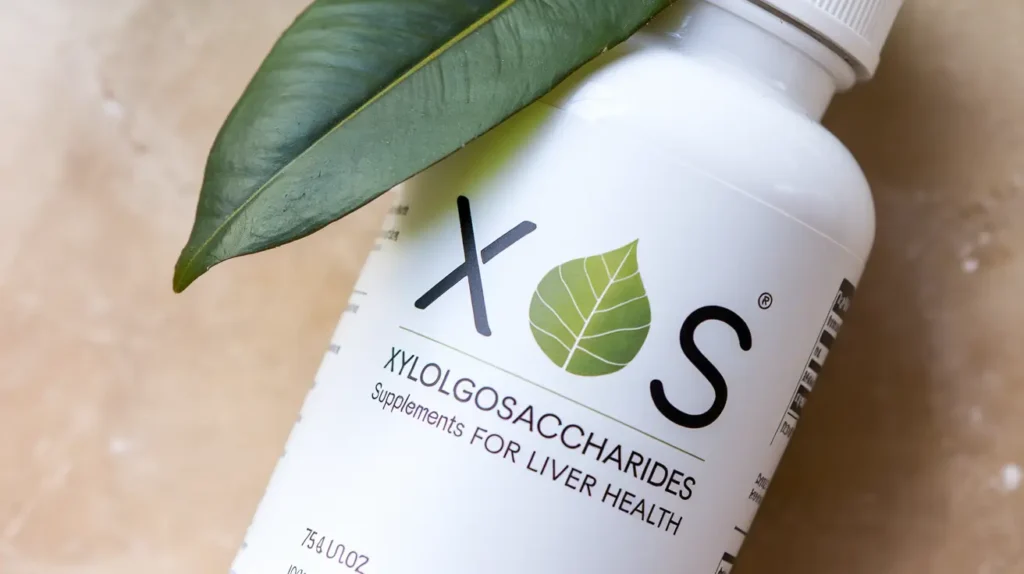Is Xylooligosaccharide Good for the Liver? This question has garnered attention as research into functional food ingredients grows, particularly for their potential health benefits. Xylooligosaccharides (XOS), derived from xylan in lignocellulosic materials, are known to exhibit prebiotic properties, which may support liver health through their effects on gut microbiota. Studies suggest that xylooligosaccharides can play a role in liver protection and managing non-communicable diseases.

BSH Ingredients, a leading XOS factory in China, is at the forefront of producing these beneficial sugar oligomers. The physicochemical properties of XOS, including their low degree of polymerization, enhance their functional applications in food processing and nutraceuticals. As a result, they may help maintain intestinal health and potentially reduce the risk of colon cancer while promoting probiotics’ growth.
Research highlights the functional properties of XOS, including their role in modulating intestinal villus height and absorption in the jejunum. Their unique structure allows for diverse food applications, making them an interesting topic in the functional food market. Incorporating xylooligosaccharides into diets could provide a promising avenue for enhancing liver function and overall health.
What Is Xylooligosaccharide (XOS)?
Xylooligosaccharides (XOS) are categorized as prebiotic fibers that play a significant role in enhancing gut health. They can stimulate the growth of beneficial bacteria and support various metabolic processes in the body.
Definition Of XOS As A Prebiotic Fiber
XOS are non-digestible oligosaccharides derived from the hydrolysis of xylan, a major hemicellulose found in plant cell walls. As prebiotic fibers, they serve as food for probiotics, promoting their growth and activity in the gut microbiome.
Prebiotics, including XOS, are notable for their selective fermentation properties. This means they only promote the growth of specific beneficial microorganisms while remaining undigested in the stomach and small intestine. Unlike fructooligosaccharides (FOS), inulin, or galactooligosaccharides (GOS), XOS specifically favors the growth of beneficial bacteria, such as Bifidobacteria and Lactobacilli.
How XOS Supports Gut Health By Promoting Beneficial Bacteria
XOS enhances gut health by selectively stimulating the proliferation of beneficial bacteria. When consumed, XOS is fermented in the colon, producing short-chain fatty acids (SCFAs) that support gut health.
The increase in SCFAs can help lower the pH of the colon, thereby creating an inhospitable environment for pathogenic bacteria. This prebiotic characteristic of XOS helps maintain a balanced gut microbiome.
Additionally, XOS can improve bowel regularity and reduce the risk of gastrointestinal issues. By contributing to a diverse microbiota, XOS assists in the overall digestive process, which is vital for nutrient absorption and metabolic health.
The Gut-Liver Axis: Why It Matters
The gut-liver axis is a crucial connection between the gastrointestinal tract and liver function. It highlights the importance of gut health in maintaining overall well-being, including metabolic processes and immune regulation.
Explanation Of The Gut-Liver Connection In Maintaining Health
The gut-liver axis refers to the bidirectional communication between the gut and the liver. Nutrients and metabolites from the intestines travel to the liver via the portal vein, influencing liver metabolism and function.
This connection impacts various processes, including detoxification and glucose homeostasis. For instance, when gut microbiota breaks down carbohydrates, short-chain fatty acids (SCFAs) are produced. SCFAs can regulate liver functions and affect lipid metabolism.
A healthy intestinal barrier prevents the translocation of harmful bacteria and endotoxins. If compromised, it can lead to increased inflammation and liver conditions such as non-alcoholic fatty liver disease (NAFLD).
Role Of Gut Microbiota In Liver Function And Overall Health
Gut microbiota plays a significant role in liver health and regulation of the immune system. Bifidobacterium and Lactobacilli contribute to a balanced microbiome, supporting intestinal health and immune modulation.
An imbalance in intestinal microbial diversity can result in gastrointestinal disorders. This imbalance can lead to chronic inflammation and negatively impact liver function. For example, lactic acid bacteria help maintain gut health by promoting a healthy intestinal barrier and enhancing the secretion of secretory IgA (sIgA), essential for immune defense.
The cecal microbiota and other microbiome components can modulate liver processes and influence metabolic functions. Therefore, maintaining gut health through diet and probiotics can be vital for optimal liver health and overall wellness.
How Xylooligosaccharide Benefits The Liver
Xylooligosaccharides (XOS) offer several noteworthy benefits for liver health. Their ability to reduce inflammation, support fat metabolism, improve insulin sensitivity, and enhance antioxidant protection can significantly mitigate liver damage and optimize liver function.
Reduces Inflammation: Impact Of XOS On Gut-Derived Inflammation Affecting The Liver
Xylooligosaccharides have been shown to reduce inflammatory responses in the liver. They modulate the gut microbiota, producing short-chain fatty acids (SCFAs). These SCFAs help lower levels of pro-inflammatory cytokines such as TNF-α, crucial contributors to liver inflammation.
Research indicates that XOS can improve gut health by promoting beneficial bacteria that produce SCFAs. This, in turn, mitigates the systemic inflammation linked to obesity and fatty liver disease. By reducing gut-derived inflammation, XOS can protect liver tissues, enhancing overall liver function.
Supports Fat Metabolism: Potential For Reducing Liver Fat And Improving Lipid Profiles
Xylooligosaccharides may also support lipid metabolism, specifically in reducing liver fat and improving lipid profiles. Studies suggest that the consumption of XOS can lead to decreased triglyceride levels in individuals, particularly those on high-fat diets.
The mechanism involves enhancing fat oxidation and decreasing the accumulation of triglycerides in the liver. Improved lipid metabolism can lead to better management of serum lipids, thus reducing the risk of fatty liver disease and its associated complications.
Improves Insulin Sensitivity: Role Of XOS In Preventing Metabolic Conditions Linked To Liver Damage
The role of xylooligosaccharides in improving insulin sensitivity is significant. Increased insulin sensitivity can prevent the onset of metabolic conditions like insulin resistance, often associated with liver damage and fatty liver disease. XOS influences gut hormones that play a role in glucose metabolism.
By lowering blood glucose levels, XOS helps reduce the risk of hyperglycemia and associated liver complications. This improvement in metabolic health can ultimately support liver function and reduce the risk of developing liver-related diseases.
Enhances Antioxidant Protection: How XOS-Derived Short-Chain Fatty Acids (SCFAs) Protect The Liver
Xylooligosaccharides contribute to antioxidant activity in the liver through SCFAs. These fatty acids are known to have protective effects against oxidative stress, a contributor to liver damage. Increased SCFA production from XOS consumption can enhance the liver’s antioxidant defenses.
By neutralizing free radicals and reducing oxidative damage, these SCFAs support liver health. They can also improve the liver’s ability to detoxify harmful substances, making XOS a beneficial component in protecting the liver from various metabolic stresses.
Scientific Evidence Supporting XOS For Liver Health
Research into xylooligosaccharides (XOS) indicates promising benefits for liver health through various mechanisms. Multiple studies explore how XOS can influence liver function and overall metabolic health.
Summary Of Relevant Studies On XOS And Liver Benefits
Numerous studies have looked at the impact of XOS on liver health. One study found that XOS consumption helped reduce fatty liver disease markers in animal models. Another research showed that it enhanced liver enzyme levels, indicating improved liver function.
Additionally, preliminary human trials suggest that XOS may positively affect liver health by reducing inflammation and oxidative stress. Participants exhibited lower levels of liver enzymes related to liver damage after XOS supplementation.
Key Findings From Animal And Human Trials
Animal studies provide valuable insight into how XOS contributes to liver health. For instance, a trial with mice showed that XOS reduced liver fat accumulation by promoting beneficial gut microbiota. This shift in microbial populations is linked to improved liver metabolism.
In human trials, individuals who supplemented their diets with XOS experienced significant improvements in liver enzyme profiles. These changes suggest a potential for XOS to mitigate liver-related diseases and enhance metabolic health.
Furthermore, the effects on gut health might be crucial, as a healthy gut can support liver function through various pathways.
Gaps In Current Research And Areas For Further Exploration
Despite the promising findings, there are gaps in the current body of research. Most studies have been conducted on small sample sizes, and long-term effects have not been thoroughly evaluated.
Also, variations in individual responses to XOS supplementation warrant further investigation. Future research should focus on diverse populations to comprehensively understand the potential variability in liver health benefits.
Moreover, the exact mechanisms by which XOS affects liver health require additional exploration. More extensive clinical trials could clarify dosage, optimal forms of XOS, and specific liver conditions it may benefit.
How To Use Xylooligosaccharide For Liver Health
Xylooligosaccharides (XOS) can be beneficial for liver health when used appropriately. This section outlines safe dosage recommendations, various forms of XOS, and important precautions for those with specific health conditions.
Safe Dosage Recommendations Based On Existing Studies
Current research on XOS suggests a safe daily dosage range of 2 to 10 grams. Studies indicate that XOS may improve liver function within this range by promoting beneficial gut bacteria.
Exceeding this recommended dose may not enhance its effects and could lead to gastrointestinal discomfort, such as gas or bloating. Individuals should gradually introduce XOS into their diet to monitor for tolerance.
It is advisable to consult with a healthcare professional before starting XOS, particularly for those with existing health issues or concerns about dietary supplements.
Forms Of XOS (e.g., Supplements, Food Sources)
XOS can be found in various forms, including dietary supplements and certain food sources. Some common food sources are whole grains, fruits, and vegetables containing XOS.
Dietary supplements are available in powdered and capsule forms. Supplements often provide a concentrated dose, making it easier to achieve desired intake levels.
Integrating XOS-rich foods alongside supplementation may offer synergistic benefits for those seeking to improve liver health. Attention to the source and quality of supplements is essential for maximizing health benefits.
Precautions And Considerations For Specific Health Conditions
Individuals with specific health conditions must exercise caution when using XOS. Those with gastrointestinal disorders, like irritable bowel syndrome (IBS), might experience discomfort due to increased fiber intake.
In patients with liver diseases, such as cirrhosis or hepatitis, it’s crucial to consult a healthcare provider before starting XOS.
Individuals taking certain medications that affect liver function should also consider potential interactions. Monitoring mineral absorption while using XOS is also important, as excessive fiber can sometimes interfere with nutrient uptake.
Conclusion

Research indicates that xylooligosaccharides (XOS) offer several benefits for liver health. Attention to specific advantages, the importance of medical guidance, and practical integration into daily routines are crucial for maximizing these benefits.
Recap Of XOS Benefits For Liver Health
Xylooligosaccharides potentially support liver health through various mechanisms. They promote the growth of beneficial gut bacteria, which can contribute to improved gut-liver axis function. Enhanced fermentation of XOS produces short-chain fatty acids, which are known to have anti-inflammatory properties.
Multiple studies suggest that XOS may reduce oxidative stress and improve metabolic profiles. They can assist in decreasing fat accumulation in the liver. This balance between gut health and liver performance makes XOS a promising component in liver health management.
Final Thoughts On Incorporating XOS Into A Healthy Lifestyle
Incorporating xylooligosaccharides into a balanced diet can enhance overall health and well-being. They can be found in various foods or as dietary supplements, providing flexibility in choosing the most convenient option.
Integrating XOS does not require drastic changes; small adjustments can lead to significant improvements. Incorporating fiber-rich foods like fruits, vegetables, and whole grains alongside XOS can further support liver health. This holistic approach, focusing on nutrition and lifestyle, can contribute positively to liver function and general health outcomes.
Frequently Asked Questions
This section addresses common inquiries about xylooligosaccharide and its potential impact on liver health, digestive wellness, and associated risks. It provides clear information based on current research findings.
How does xylooligosaccharide impact liver health?
Xylooligosaccharide (XOS) may promote liver health by supporting beneficial gut bacteria. A balanced gut microbiome can reduce inflammation and improve metabolic processes that affect liver function.
Can prebiotics like XOS improve liver function?
Prebiotics, including XOS, have shown promise in enhancing liver function. Improving gut health may help mitigate factors that lead to liver damage, though specific clinical outcomes require further investigation.
What benefits does xylooligosaccharide offer for digestive wellness?
Xylooligosaccharide is known to enhance digestive wellness. It aids in preventing constipation, increasing the absorption of minerals, and promoting regular bowel movements, thus contributing to overall gastrointestinal health.
Are there any risks associated with taking xylooligosaccharide for individuals with liver conditions?
While xylooligosaccharide is generally safe, individuals with liver conditions should exercise caution. Some may experience bloating or discomfort, necessitating consultation with a healthcare professional before use.
How do xylooligosaccharides compare to other prebiotics in terms of liver support?
Compared to other prebiotics, xylooligosaccharides may offer unique benefits for liver support. Research suggests that XOS effectively promotes beneficial gut bacteria, similar to other prebiotics, with specific implications for liver health.
Does the consumption of xylooligosaccharides correlate with changes in liver enzymes?
Current studies indicate that xylooligosaccharide consumption may influence liver enzymes positively. Monitoring these enzymes can help assess liver function and identify potential changes associated with prebiotic intake.

